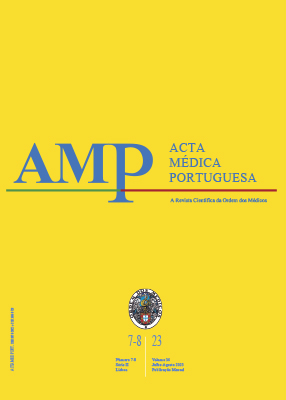Acute Hepatitis of Unknown Origin in Children: Two Cases in a Portuguese Hospital
DOI:
https://doi.org/10.20344/amp.18690Keywords:
Acute Disease, Child, Disease Outbreaks, Hepatitis, PortugalAbstract
Several cases of paediatric acute hepatitis of an unknown aetiology have been described in these last few months and in several countries worldwide. We present two patients, a 7-month-old girl and an 8-year-old boy, with gastrointestinal symptoms and lethargy, associated with elevation of transaminase levels. Serologies for hepatitis A-E virus and PCR test to SARS-CoV-2 were all negative. In the first case, an adenovirus serotype C could be isolated in a respiratory sample as well as cytomegalovirus (CMV) in the blood (100 copies/mL). In both children, there was a progressive decrease in the hepatic markers and symptomatic resolution, compatible with a good prognosis, also seen globally in most cases. To date, infection remains the most plausible cause to consider, especially when it is presumed to be linked to adenovirus. Other potential agents and causes are still being evaluated, thus emphasizing the importance of continuous epidemiological surveillance, notification, and detailed study of all hepatitis cases.
Downloads
References
Marsh K, Tayler R, Pollock L, Roy K, Lacka F, Ho A, et al. Investigation into cases of hepatitis of unknown aetiology among young children, Scotland, 1 January 2022 to 12 April 2022. Euro Surveill. 2022;27:2200318. DOI: https://doi.org/10.2807/1560-7917.ES.2022.27.15.2200318
World Health Organization. Disease outbreak news; acute hepatitis of unknown aetiology in children - multi-country. [cited 2022 Jun 07]. Available from: https://www.who.int/emergencies/disease-outbreak-news/item/2022-DON389.
European Centre for Disease Prevention and Control, World Health Organization Regional Office for Europe. Joint ECDC-WHO Regional Office for Europe Hepatitis of Unknown Origin in Children Surveillance Bulletin. [cited 2022 Jun 25]. Available from: https://cdn.ecdc.europa.eu/novhep-surveillance/.
The United Kingdom Health Security Agency (UKHSA). Acute hepatitis technical briefing 3. [cited 2022 May 29]. Available from: https://www.gov.uk/government/publications/acute-hepatitis-technical-briefing (link is external).
Sun C, Lowe S, Li Y, Bentley R, King B, Uy JP. Does adenovirus cause the acute hepatitis of unknown etiology among children? Epstein-Barr virus may give us a hint. Travel Med Infect Dis. 2022;49:102363. DOI: https://doi.org/10.1016/j.tmaid.2022.102363
Brodin P, Arditi M. Severe acute hepatitis in children: investigate SARS-CoV-2 superantigens. Lancet Gastroenterol Hepatol. 2022 2022;7:594-5. DOI: https://doi.org/10.1016/S2468-1253(22)00166-2
Cevik M, Rasmussen AL, Bogoch II, Kindrachuk J. Acute hepatitis of unknown origin in children. BMJ. 2022;377:o1197. DOI: https://doi.org/10.1136/bmj.o1197
Direção Geral de Saúde. Orientação n.º 005/2022 - Orientação sobre os casos suspeitos de hepatite aguda de etiologia desconhecida em idade pediátrica. Lisboa: DGS; 2022.
Baker JM, Buchfellner M, Britt W, Sanchez V, Potter JL, Ingram A, et al. Acute hepatitis and adenovirus infection among children — Alabama, October 2021–February 2022. MMWR Morb Mortal Wkly Rep. 2022;71:638-40. DOI: https://doi.org/10.15585/mmwr.mm7118e1
Rawat SK, Asati AA, Jain A, Mishra N, Ratho RK. Covid-19 Associated hepatitis in children (CACH) during the second wave of SARS-CoV-2 infections in Central India: is it a complication or transient phenomenon. medRxiv. 2021.07.23.21260716.
Downloads
Published
How to Cite
Issue
Section
License
Copyright (c) 2023 Acta Médica Portuguesa

This work is licensed under a Creative Commons Attribution-NonCommercial 4.0 International License.
All the articles published in the AMP are open access and comply with the requirements of funding agencies or academic institutions. The AMP is governed by the terms of the Creative Commons ‘Attribution – Non-Commercial Use - (CC-BY-NC)’ license, regarding the use by third parties.
It is the author’s responsibility to obtain approval for the reproduction of figures, tables, etc. from other publications.
Upon acceptance of an article for publication, the authors will be asked to complete the ICMJE “Copyright Liability and Copyright Sharing Statement “(http://www.actamedicaportuguesa.com/info/AMP-NormasPublicacao.pdf) and the “Declaration of Potential Conflicts of Interest” (http:// www.icmje.org/conflicts-of-interest). An e-mail will be sent to the corresponding author to acknowledge receipt of the manuscript.
After publication, the authors are authorised to make their articles available in repositories of their institutions of origin, as long as they always mention where they were published and according to the Creative Commons license.









